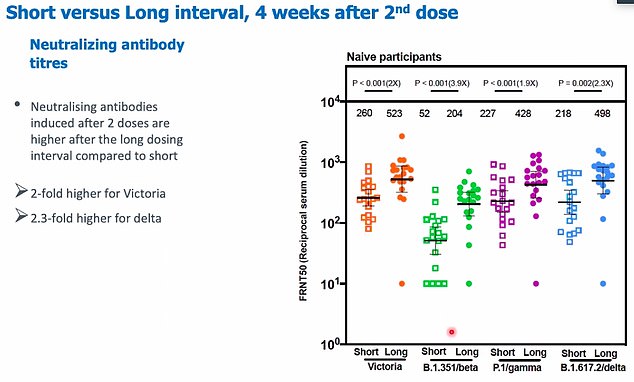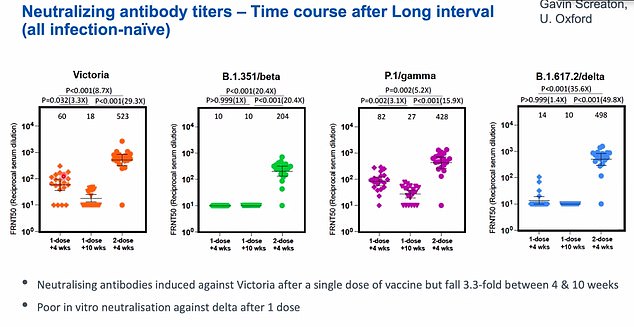
Professor Susanna Dunachie, a medical microbiologist at the University of Oxford, says she said she would not recommend people try to bring their second jab appointments forward
Britons have been urged not to get their second Covid jab early because it could lead to weaker protection against the virus.
A study by scientists from the country’s best universities found having at least six weeks between doses of Pfizer’s vaccine increases immunity, with eight weeks the ‘sweet spot’.
It comes amid growing concerns young people will rush to get their top-up jab prematurely so they can go on quarantine-free summer holidays to amber list destinations.
Some vaccine centres offer walk-in services, which have been accepting people who had their first Pfizer jab as little as three weeks beforehand.
The study of 500 NHS staff found waiting ten weeks rather than three weeks causes the body to produce more than twice as many antibodies to fight off the Indian ‘Delta’ Covid variant.
Professor Susanna Dunachie, a medical microbiologist at the University of Oxford, and lead author of the study said: ‘I think eight weeks is about the sweet spot for me.
‘Because [while] people do want to get the two vaccines and there is a lot of Delta out there right now, unfortunately I can’t see this virus disappearing, so you want to balance that against getting the best protection that you can.
‘And there’s also population level decisions as well.’
The Government is also due to relax self-isolation rules for people who have had both vaccines next month, which has raised fears people will try to get their second jab too early.
It comes on the back of studies by AstraZeneca and Pfizer showing immunity is strongest when their is a twelve-week pause between doses.
But ministers shortened the regimen to get more people fully protected before the month turn colder and the NHS comes under further pressure from flu.
It comes on the back of studies by AstraZeneca and Pfizer showing immunity is strongest when there is a twelve-week pause between doses.

Research by the universities of Oxford, Newcastle, Sheffield, Liverpool and Birmingham showed longer waits between Pfizer jabs improves the number of antibodies produced by the body. Graph shows: The level of antibodies against the original ‘Victoria’ Covid variant, the South Africa ‘Beta’ variant, Brazil ‘Gamma’ variant and Indian ‘Delta’ variant in participants’ blood after short (three to four-week) and long (six to 14-week) intervals between vaccine doses
The PITCH study — funded by the Department of Health and Social Care (DHSC) — looked at immunity levels after ‘short’ three to four-week or ‘long’ six to 14-week intervals between first and second doses.
It found antibodies tended to drop off between doses but T-cells — a vital part of the immune system — remained at the same level, meaning people were still protected against the virus.
Research was carried out by the universities of Oxford, Newcastle, Sheffield, Liverpool and Birmingham.
They took blood samples from participants to determine the level of antibodies and T-cells – two crucial parts of the immune response to Covid.
It did not examine the effects of dosing intervals on the AstraZeneca vaccine but the results are likely to be similar for the Moderna jab, which uses the same MRNA technology as Pfizer’s.
AstraZeneca’s vaccine is known to take slightly longer to elicit an immune response than Pfizer and Moderna’s jabs.
Of the 503 healthcare workers recruited to the study, 223 (44 per cent) had previously had Covid, 76 per cent were female and 86 per cent were white.
Researchers found antibody levels against the Delta variant low after a single dose and dropped off before the second dose. But they were strong after both jabs.
And they were twice as high for people having the longer dosing interval compared to shorter ones.
T-cells stayed at the same level between doses but were 1.6 times lower in people who had the long interval after both jabs.

Researchers found antibody levels against the Delta variant (shown in blue) were low after a single dose and dropped off before the second dose. But they were strong after both jabs
The longer dosing interval resulted in higher antibodies for the ‘Indian’ Delta, ‘Kent’ Alpha, ‘South Africa’ Beta and ‘Brazil’ Gamma variants
Speaking at a press conference yesterday, the study’s authors said the results showed people are better off waiting the full eight weeks between jabs.
Professor Susanna Dunachie, a medical microbiologist at the University of Oxford, said the current recommendation is the best way to balance the need to fully vaccinate everyone as soon as possible while ensuring they have the best protection they can during the third wave.
Asked what she would tell someone considering shortening their wait between doses, she said she would not recommend people try to bring their second jab appointments forward.
When should I get my second dose?
The Government’s top scientists say everyone under the age of 40 should wait at least eight weeks before getting their second dose and no more than 12.
It comes after over-40s had their second dose gap shortened last month in the face of the Indian variant.
Professor Anthony Harnden, who helped design the jabs priority list, said he wouldn’t recommend getting the second dose of the AstraZeneca vaccine sooner than eight weeks after the first.
But he added the second dose of the Pfizer jab can be given from three to 12 weeks after the first dose.
Numerous studies have suggested that both the Pfizer and AstraZeneca jabs are more effective after a longer period between doses.
Second doses can be booked online with the NHS, or received at walk-in clinics.
There are around eight million adults in Britain who are yet to receive their first dose.
Advertisement
Speaking at a press briefing, Professor Dunachie said: ‘I think eight weeks is about the sweet spot for me.
‘Because [while] people do want to get the two vaccines and there is a lot of Delta out there right now, unfortunately I can’t see this virus disappearing, so you want to balance that against getting the best protection that you can.
‘And there’s also population level decisions as well.’
Professor Dunachie said: ‘I think it’s quite a balance because, as I say, this virus isn’t going away, so you really want to protect your population.
‘And if you’re in the middle of a surge you need to use all the measures you can to control that, as well as vaccination.’
And Professor Miles Carrol, a public health expert at the University of Oxford, added: ‘The science says with the extended interval, it’s not detrimental, it’s slightly better.’
Boris Johnson announced earlier this month Britons under the age of 40 will be offered their second Covid jab after eight weeks instead of 12.
The Prime Minister claimed the new aim was for all adults to be fully inoculated by mid-September, when coronavirus rates are expected to rise and the NHS grapples with seasonal winter pressures.
Last month, the gap was shortened for older people in a bid to protect millions of the most vulnerable amid the rise of the highly-infectious Indian variant.
Originally, both AstraZeneca and Pfizer’s vaccines were approved to be dished out in three-week intervals because that was the gap tested in the research trials.
But No10’s scientists pushed the regimen back to 12 weeks to get wider protection in winter, when the second wave started to take off.
Studies since have shown both jabs actually perform slightly better when the doses are spaced out for longer than a month.
Vaccines Minister Nadhim Zahawi said: ‘The findings from this latest PITCH study are hugely significant not just for the UK but for the world, helping us better understand the mechanics behind our immune response to Covid and the importance of getting both doses of the vaccine.
‘As we raced to offer a vaccine to all adults, we took the JCVI’s advice to shorten the dosing interval from 12 to 8 weeks to help protect more people against the Delta variant.
‘This latest study provides further evidence that this interval results in a strong immune response and supports our decision.
‘I urge every adult to get both doses of the vaccine protect yourself and those around you and we are looking to offer millions of the most vulnerable a booster jab from September to ensure this protection is maintained.’
Source link : https://www.dailymail.co.uk/news/article-9813975/Covid-19-UK-Pfizer-vaccine-works-better-spaced-eight-weeks-scientists-say.html











